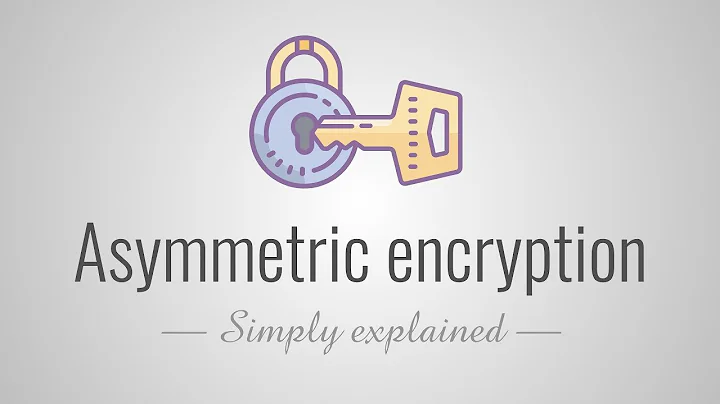How to check if an RSA public / private key pair match
Solution 1
I would prefer the ssh-keygen -y -e -f <private key> way instead of the accepted answer of How do you test a public/private DSA keypair? on Stack Overflow.
ssh-keygen -y -e -f <private key> takes a private key and prints the corresponding public key which can be directly compared to your available public keys. (Hint: beware of comments or key-options.)
(How the hell is it doing that? I can only hope the public key is encoded directly or indirectly in the private key...)
I needed this myself and used the following Bash one-liner. It should output nothing if the keys belong together. Apply a little -q to the diff in scripts and diff only sets the return code appropriately.
PRIVKEY=id_rsa
TESTKEY=id_rsa.pub
diff <( ssh-keygen -y -e -f "$PRIVKEY" ) <( ssh-keygen -y -e -f "$TESTKEY" )
Solution 2
Depending on where you get the public key file you are testing, the accepted answer may give false positive results. This is because of the behavior described in the comment by @drewbenn. Specifically, when the -e option is used with the private key file as the -f option parameter, it simply parrots (but reformats) what's in the associated public key file.
In other words,
ssh-keygen -y -f id_rsa
(apparently) generates the public key value, and
ssh-keygen -y -e -f id_rsa
simply and outputs (and reformats) the key in the existing id_rsa.pub whatever it is.
In my case, I have to verify that the pair has not been corrupted. So, I decided to compare the following:
ssh-keygen -y -f id_rsa | cut -d' ' -f 2
with
cut -d' ' -f 2 id_rsa.pub
Therefore:
diff <(cut -d' ' -f 2 id_rsa.pub) <(ssh-keygen -y -f id_rsa | cut -d' ' -f 2)
Perhaps this is not as flexible, but it is better for my needs. Maybe it helps someone else.
Solution 3
The easiest is to compare fingerprints as the public and private keys have the same. Visual comparison is pretty easy by putting the two commands on same line:
ssh-keygen -l -f PRIVATE_KEY; ssh-keygen -l -f PUBLIC_KEY
Programmatically, you'll want to ignore the comment portion so
diff -s <(ssh-keygen -l -f PRIVATE_KEY | cut -d' ' -f2) <(ssh-keygen -l -f PUBLIC_KEY | cut -d' ' -f2)
Solution 4
If they're on your local system, stick id_rsa.pub in your $HOME/.ssh/authorized_keys and ssh to localhost using the id_rsa key. If it works, then they match.
cat $HOME/.ssh/id_rsa.pub >> $HOME/.ssh/authorized_keys
ssh -i $HOME/.ssh/id_rsa localhost
Related videos on Youtube
Ryan
Updated on September 18, 2022Comments
-
Ryan over 1 year
I have two files,
id_rsaandid_rsa.pub. What command can be used to validate if they are a valid pair?-
 Admin over 10 yearsI'll confirm Michuelnik's answer; it saved me from having to make a new key pair, thanks.
Admin over 10 yearsI'll confirm Michuelnik's answer; it saved me from having to make a new key pair, thanks.ssh -vhelps a lot too.
-
-
 Sirch over 10 years"How the hell is it doing that".. The private key is generated from randomness so we all have a unique key. If you apply the repeatable one-way RSA algorithm on this private key, youll get the unique public key. There is no algorithm that you can perform on the public key thatll get a unique private key.
Sirch over 10 years"How the hell is it doing that".. The private key is generated from randomness so we all have a unique key. If you apply the repeatable one-way RSA algorithm on this private key, youll get the unique public key. There is no algorithm that you can perform on the public key thatll get a unique private key. -
Michuelnik over 10 years@Sirch: I thought the decision which key is private and which one is public is pure random since the two keys are equal. What one key encrypts can only be decrypted with the other. And if one key could be obtained from the other this all would not work out.
-
 Sirch over 10 years@Michuelnik You can derive the public key from the private key. You cant derive the private key from the public key. Were not talking about the material that it encrypts.
Sirch over 10 years@Michuelnik You can derive the public key from the private key. You cant derive the private key from the public key. Were not talking about the material that it encrypts. -
Michuelnik over 10 years@sirch: I'll definitly have to recheck rsa... thanks.
-
Krista K over 10 years@Michuelnik imho, the question is off topic on SO and on-topic here (and/or Superuser). imho, it shouldn't be marked as duplicate and instead flagged there for migration. But it's covered on both so I like the more complete sharing of information.
-
 Admin over 9 yearsThe cited question states to use OpenSSL commands. Unfortunately, those commands don't call their own relevant APIs, like
Admin over 9 yearsThe cited question states to use OpenSSL commands. Unfortunately, those commands don't call their own relevant APIs, likeDSA_checkandRSA_check. The commands just parse and print. And if you check the return value from theopenssl dsa ..., you will find that it returns 1, which is failure. -
 Admin almost 9 yearsAs long as id_rsa.pub exists,
Admin almost 9 yearsAs long as id_rsa.pub exists,ssh-keygen -y -e -f id_rsawill not check id_rsa at all but just return the value from id_rsa.pub. So e.g. if youecho 5 > id_rsato erase the private key, then do the diff, the diff will pass! Also, runningssh-keygen -yef foowhere foo is not a valid key (and has no corresponding foo.pub) will block waiting for user input, so be careful using this in a script. -
thomanski over 7 yearsThis really should replace the accepted answer or at least surpass it in terms of upvotes.
-
 Yaroslav Nikitenko over 4 yearsThank you! This command doesn't work with keys with a passphrase, it doesn't ask that interactively. I extracted the two () command contents to files and diff-ed them, that works.
Yaroslav Nikitenko over 4 yearsThank you! This command doesn't work with keys with a passphrase, it doesn't ask that interactively. I extracted the two () command contents to files and diff-ed them, that works. -
Vasiliki over 3 yearsWhat if it's still prompting you for a password? Permissions of authorized_keys are correct, the public key has been copied correctly in the authorized_keys, I also did the diff mentioned in the verified answer and keys belong together.
-
Dave M over 2 yearsThis does not provide an answer to the question. Once you have sufficient reputation you will be able to comment on any post; instead, provide answers that don't require clarification from the asker. - From Review
-
dave_thompson_085 over 2 years-l is the fingerprint, as Oliver correctly said; it is not the modulus and it is not limited to RSA.
-
 sancho.s ReinstateMonicaCellio over 2 yearsThis might be a little intrusive. The answer by Olivier is not.
sancho.s ReinstateMonicaCellio over 2 yearsThis might be a little intrusive. The answer by Olivier is not. -
 sancho.s ReinstateMonicaCellio over 2 years@YaroslavNikitenko - I had the same problem. The answer by Olivier, which is similar but rearranged, removes the problem.
sancho.s ReinstateMonicaCellio over 2 years@YaroslavNikitenko - I had the same problem. The answer by Olivier, which is similar but rearranged, removes the problem. -
 sancho.s ReinstateMonicaCellio over 2 yearsThis gives the result right away.
sancho.s ReinstateMonicaCellio over 2 yearsThis gives the result right away. -
 Admin almost 2 yearsThis holds the same limit as mentioned in the answer above: it will not calculate fingerprint from the private key if public key file exists. Instead, it will just print out the fingerprint of whatever is in public key file. Therefore, you may have public key different from private key and the test will still pass.
Admin almost 2 yearsThis holds the same limit as mentioned in the answer above: it will not calculate fingerprint from the private key if public key file exists. Instead, it will just print out the fingerprint of whatever is in public key file. Therefore, you may have public key different from private key and the test will still pass.




